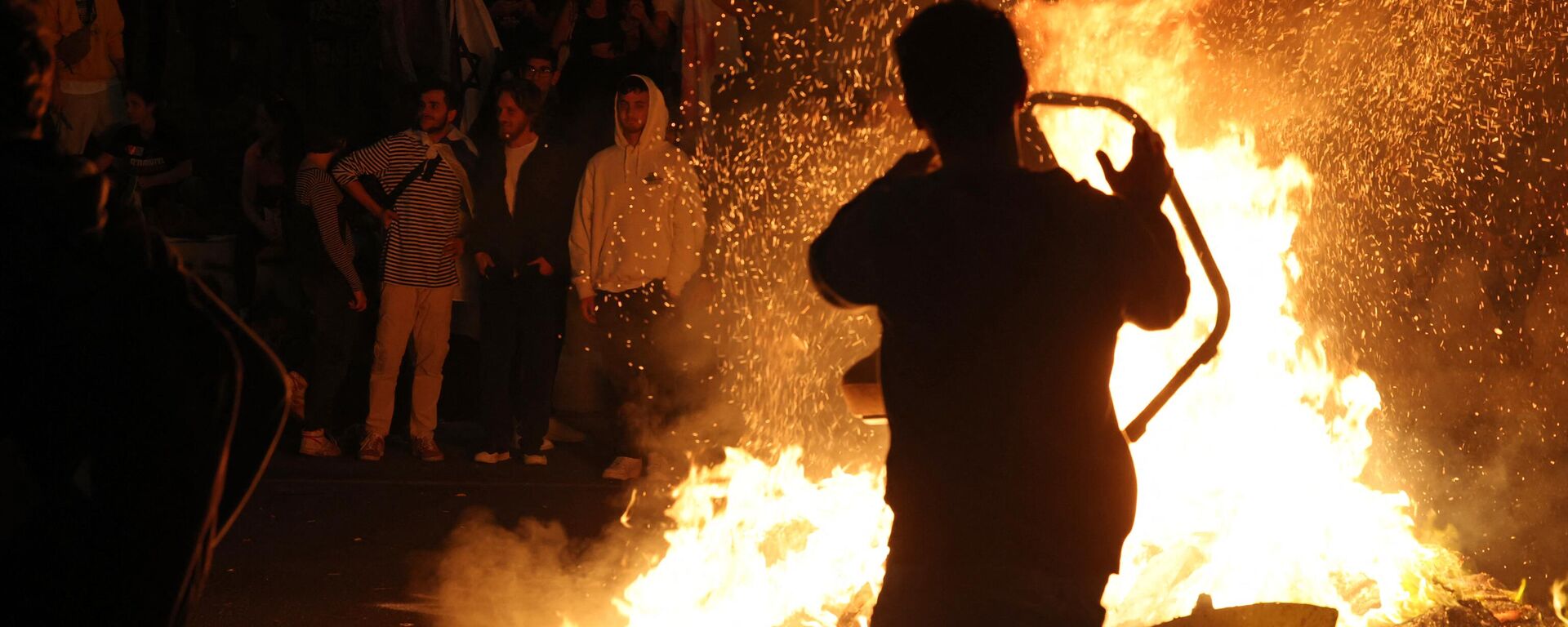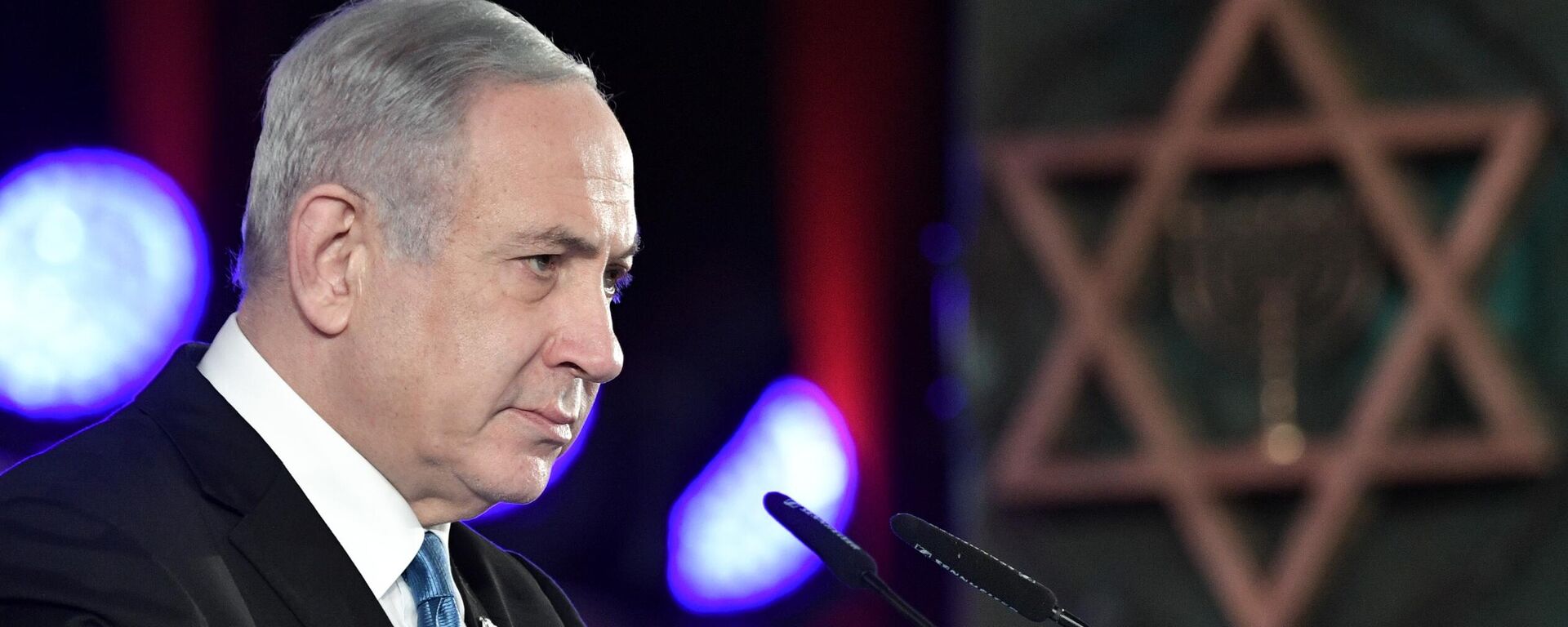Judicial Reform Protests: Could Netanyahu Navigate His Coalition Through Crisis?

© AP Photo / Ariel Schalit
Subscribe
Prime Minister Benjamin Netanyahu has agreed to postpone the judicial reform legislation until the summer following protests. How could the unfolding tensions influence the Netanyahu government and his coalition?
"I think that the reform was just one aspect of the tensions in Israeli society, when a part of Israeli society feels that the demographic trends in Israel are dooming it to be always in a minority," Professor Efraim Inbar, president of the Jerusalem Institute for Strategy and Security, told Sputnik.
"I'm talking primarily about more privileged Ashkenazi Jews, concentrating in Tel Aviv. They are fearful that the Haredi community - the Orthodox community, as well as Sephardic Jews, have more children and they will lose the chance of gaining power again. And to some extent, the Supreme Court of Justice, that is the subject of the legal reform, is seen as the last bastion of power. So it's a complex situation. It's not so much about legal reform, it's about a power struggle among different parts of Israeli society," he continued.
In January, Israeli Justice Minister Yariv Levin proposed a legal reform package that would limit the authority of the Supreme Court by giving the Israeli government control over the selection of new judges, as well as allowing the Knesset to override the court's rulings with an absolute majority. In March, the attempt by the Netanyahu cabinet to ratify it into law was met by widespread protests. Opponents of the reform argue it would undermine democracy in Israel and put the country on the verge of a social and constitutional crisis.
Major nationwide protests erupted in Israel late Sunday night after Netanyahu fired Defense Minister Yoav Gallant over his opposition to a planned judicial overhaul.
According to the Israeli media, approximately 100,000 people protested outside the Knesset in Jerusalem on Monday, with Israeli conservatives organizing a counter-protest. In Tel Aviv, a group of demonstrators gathered on the Ayalon Highway, and blocked traffic at the Hashalom interchange. Protests also took place in Haifa and Beersheba.
Netanyahu's Likud Party signaled willingness to hit the brakes and put the reform on pause. For its part, Otzma Yehudit reportedly threatened to leave the government over Netanyahu's intention to postpone the legislation. However, on Monday, the party's leader, Ben-Gvir, said that a compromise had been reached with Netanyahu. "The reform will pass," Ben-Gvir tweeted. "The National Guard will be established. The budget I requested for the National Security Ministry will be passed in its entirety."
"First of all, we should realize that the attorney general made a clear statement that Netanyahu is not allowed to deal with the legal reform because he is involved in a trial himself, and there is some kind of a conflict of interests, despite the fact that the attorney general also has a conflict of interests, because legal advisers are also part of the reform," said Inbar.
"But having said that, Netanyahu decided last week to ignore the attorney general and try to deal with the political crisis. And today, he announced that he is actually freezing the legislation until some kind of compromise will hopefully be achieved. I don't think it's endangering his stay in power as prime minister. He made sure that all parties within his coalition are behind him in this decision of freezing the legislation. And we'll see how it develops. You can never tell what's going to happen in Israeli politics," he continued.
Is Israel on the Brink of New Elections?
It's not clear how the tensions surrounding the reform could backfire on the Netanyahu Cabinet. Still, as per Dr. Kobi Michael, a senior research fellow at the Institute for National Security Studies at Tel Aviv University, Netanyahu's decision to freeze the process "will be considered as the first crack and there is a good reason to assess that we begin counting the days towards new elections or a new coalition."
"Netanyahu lost his reputation as Mr. Security and a leader at the highest international level. We began a new era in Israel yesterday night. It was a huge achievement of the Israeli vital and vibrant democracy. Israeli society demonstrated its strength and its influence on the political arena. A legal government is not necessarily a legitimate government, and there is no doubt about the limits of power that any government could have," claimed Michael.
Professor Zeev Hanin, a political science lecturer at Ariel University and Bar-Ilan University, believes that even though "Netanyahu is indeed a political genius and an economic expert of great caliber," "at the moment, not everything is in his power."
"Regardless of the result of the current confrontation in Israeli society, whether the coalition gives up on the reform or accepts the demands of the opposition, or, let me put it this way, they agree to delay fulfilling this reform," Hanin told Sputnik. "This is the beginning of an internal break within the coalition. So most likely we will see either a change of the government or new early elections in a short period of time."
For his part, Inbar deems that the Netanyahu government will continue to rule.
"Even the parties that announced their opposition to freezing the legislation, basically agreed today to go on," he said. "Without a general election, he is assured of a majority. He has 64 seats in the Knesset, which has 120 seats, and he has a majority. There is no problem. And we will see if there is no other crisis."
Sputnik's interlocutors drew attention to the fact that the Biden administration interfered in Israel's domestic affairs, calling on Netanyahu to lend a sympathetic ear to the opposition and reach a compromise.
"It's quite clear that the Biden administration is not happy with the right-wing government," said Inbar. "And it supports the opposition. I won't be surprised to find out that American money is flowing into Israel in support of the opposition to the reform."
All in all, the unfolding problem is unlikely to shatter Israel's internal status quo, despite tens of thousands marching in the country's cities, according to the observers. One should not overestimate the internal split; Israel won't be undermined from within, Hanin concluded.



